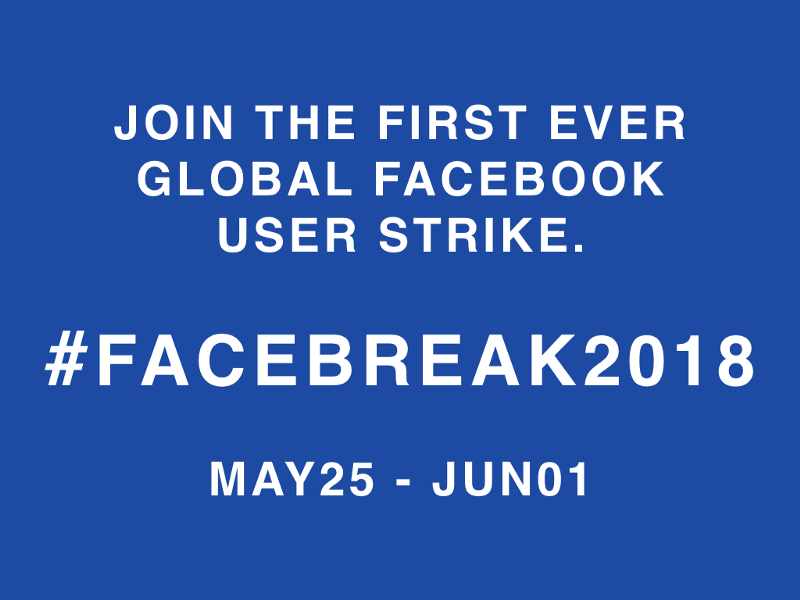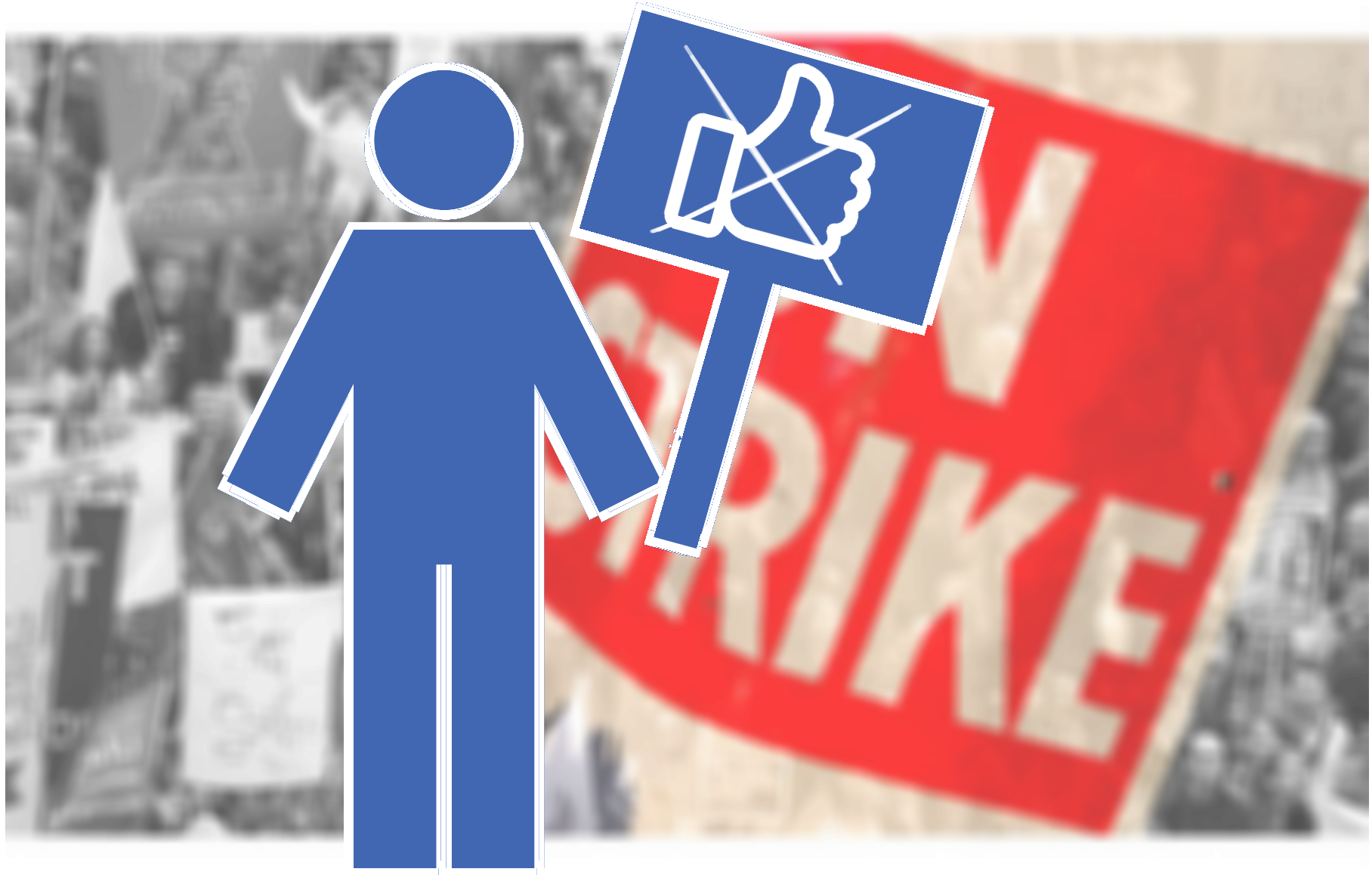Another day, another call for a Facebook “users’ strike”. This one would allegedly run from May 25 to June 1, 2018. It seems to be a one-man stunt, though (“As a collective, I propose we log out of our Facebook…”). Also, it claims to be “the first ever” strike of this kind.
 Yet, since the Cambridge Analytica scandal, new calls for strikes have been popping up every few days. As far as I know, the first one dates back to March 21 (although the actual strike is scheduled on May 18, 2018). The organizer is a seasoned Boston Globe journo, who likely just discovered what digital labor is and is SO excited to tell you:
Yet, since the Cambridge Analytica scandal, new calls for strikes have been popping up every few days. As far as I know, the first one dates back to March 21 (although the actual strike is scheduled on May 18, 2018). The organizer is a seasoned Boston Globe journo, who likely just discovered what digital labor is and is SO excited to tell you:
“I like the idea of a strike, because we users are the company’s real labor force. We crank out the millions of posts and photos and likes and links that keep people coming back for more.”
On April 9, 2018 an an obscure Sicilian newspaper called a strike action (which, in Italian, sounds like “sciopero degli utenti di Facebook”). It actually turned out to be an article about the “Faceblock” which did take place on April 11, 2018. It was a 24-hour boycott against Instagram, FB and WhatsApp organized by someone who describe themselves as “a couple of friends with roots in Belgium, Denmark, Ireland, Italy, Malta, Mexico, the UK and the US” (a tad confusing, if you ask me).
Of course, May 1st was a perfect time to call for other Facebook strikes. This one, for instance, is organized by a pseudonymous “Odd Bert”, who also mentions a fictional Internet User Union (which seems to be banned by Facebook). This other one looked a bit like some kind of e-commerce/email scam, but produced three sets of grievances.
“On May 1st, 2018, Facebook users are going on strike unless the company agrees to the following terms:
A. Full Transparency for American and British Voters
- Facebook shares the exact date it discovered Russian operatives had purchased ads.
- Facebook shares the exact dollar amount Russian operatives spent on political ads.
- Facebook shares the 3,000+ ads that Russian operatives ran during 2016.
- Facebook reveals how many users saw the fake news stories highlighted by BuzzFeed.
- Facebook lets an independent organization audit all political ads run during 2016.
- Facebook gives investigators all “Custom Lists” used for targeting 2016 political ads.
- Facebook stops running paid political ads until January 1st, 2019.
- Mark Zuckerberg (CEO) and Sheryl Sandberg (COO) testify before Congress in an open-door (televised) session.
- Mark Zuckerberg and Sheryl Sandberg testify before the UK parliament.
B. Full Transparency and Increased Privacy for Facebook Users
- Facebook explains to users exactly what personal data is being used for advertising.
- Facebook asks users for itemized consent to use photos, messages, etc. for advertising.
- Facebook gives users the ability to see a “history” of all the ads they have viewed.
- Facebook lets an independent organization investigate all data breaches since 2007.
- Facebook agrees to be audited monthly to make sure it is complying with local laws.
- Facebook allows users to easily delete their “history” on the platform.
C. Better Safety for Children on Facebook
- Facebook increases the minimum age for Facebook users from 13 to 16.
- Facebook shuts down the Messenger Kids product.”
Users’ strikes are hardly new. In 2009, the Spanish social media Tuenti was concerned by a huelga de los usuarios against their terms of service. In 2015, Reddit users disrupted the platform when they revolted en masse in solidarity with a wrongly terminated employee. On Facebook, users’ collective action is inherent to the life of the platform, whose history is replete with examples of petitions, lawsuits, and class actions. After the introduction of Beacon in 2007, a 50,000-strong petition led to its discontinuation. In 2010 several users’ groups organized and lobbied US senators and the Federal Trade Commission (FTC) to oppose the introduction of the ‘like’ button social plugin on external websites. In 2011, the association Europe versus Facebook filed numerous complaints with the Irish Data Protection Commissioner (DPC) and a class action which is presently discussed by the Court of Justice of the European Union. In 2016, the real-life protests and general mobilization against the introduction of Free Basics in India led to its successful ban by the telecommunication authority TRAI, over net neutrality and privacy concerns.
As my co-authors and I argued in our 2014 book Against the Hypothesis of the ‘End of Privacy’, the adoption of pervasive data collection practices by social platforms has been highly contentious, with frequent and cyclical privacy incidents followed by strong mass reactions. What these reactions have in common is that they are strategic, organized, collectives actions that rely on existing communities. Which could provide essential clues as to why the 2018 Facebook strikes are so ineffective. Their do not seem to be organized by active members of existing communities and they certainly do not engage with elected officials or institutional bodies. They are launched by journalists, startup bros, anonymous users trying to get noticed. These persons’ idea of grassroots is a naive one: one heroic individual (or a nonexistent “union”) sparks a revolt, hence the masses follow.
Importantly, they seem to put excessive faith in strikes seen as their only available tactic. A recent article published by a group of Stanford and Microsoft computer scientists captures this romanticized vision of “powerful” industrial actions where users stand hand in hand and nobody crosses the picket line:
“Data laborers could organize a “data labor union” that would collectively bargain with siren servers. While no individual user has much bargaining power, a union that filters platform access to user data could credibly call a powerful strike. Such a union could be an access gateway, making a strike easy to enforce and on a social network, where users would be pressured by friends not to break a strike, this might be particularly effective.”
Nevertheless, as past experiences on social platforms have taught us, successful actions adopt a specific repertoire of contention dominated not by strikes (which are usually costly and difficult to coordinate) but by lobbying and litigation. If we expect Facebook users grievances to be heard, a comprehensive and wide-ranging strategy is necessary to boost their rights. Community, organization, and the selection of effective tools are the three pillars of collective action.
